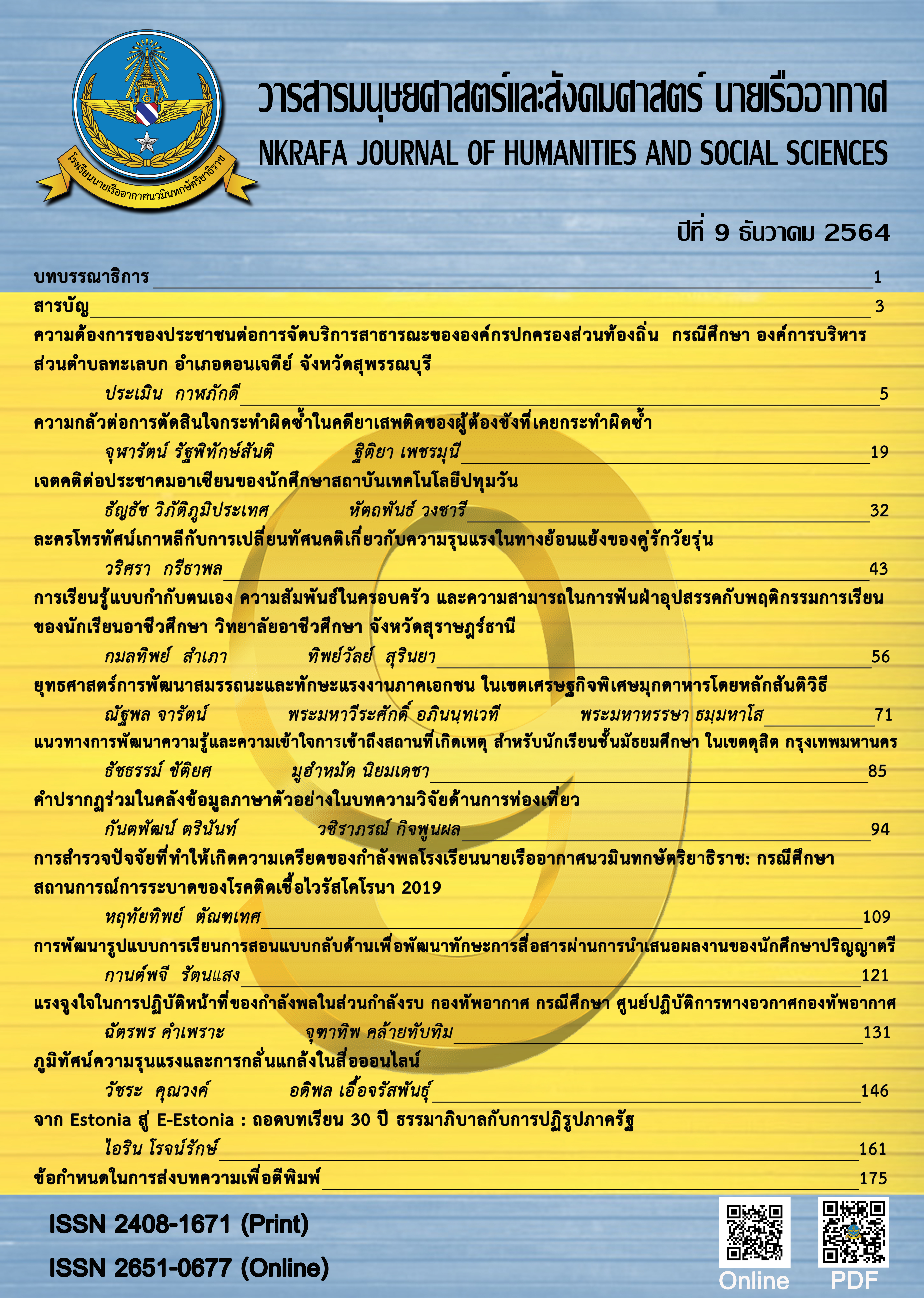Self-Directed Learning, Family Relationship, Adversity Quotient and Learning Behavior of Student’s Vocational Certificate at College of Vocational Education, Surat Thani Province
Main Article Content
Abstract
The objectives of this study were; 1) to study the level of self-directed learning, family relationship, adversity quotient and learning behavior of student. 2) to compare learning behavior by personal factors. 3) to study the correlations among self-directed learning and learning behavior of student. 4) to study the correlations among family relationship and learning behavior of student. and 5) to study the correlations among adversity quotient and learning behavior of student. The samples were 369 student at College of Vocational Education, Surat Thani Province. Data were collected by using the questionnaires. The statistic methods used for analysis were percentage, mean, standard deviation, t-test, F-test and Pearson’s Product Moment Correlation Coefficient. The statistical significance was set at .05 and .01 level. The results of this study indicated that 1) self-directed learning of student was at high level, family relationship was at high level, adversity quotient was at high level and learning behavior was at high level. 2) Students who had personal factor is sex, section and class had difference in learning behavior which was statistically significant at 0.01 level. 3) self-directed learning had correlation with learning behavior which was statistically significant at 0.01 level. 4) family relationship had correlation with learning behavior which was statistically significant at 0.01 level. and 5) adversity quotient had correlation with learning behavior which was statistically significant at 0.01 level.
Article Details
บทความที่ได้รับการตีพิมพ์เป็นลิขสิทธิ์ของวารสารมนุษยศาสตร์และสังคมศาสตร์ นายเรืออากาศ
ข้อความที่ปรากฎในบทความแต่ละเรื่องในวารสารวิชาการเล่มนี้ เป็นความคิดเห็นส่วนตัวของผู้เขียนแต่ละท่าน ไม่เกี่ยวข้องกับโรงเรียนนายเรืออากาศฯ และคณาจารย์ท่านอื่น ๆในโรงเรียนนายเรืออากาศฯ แต่อย่างใด ความรับผิดชอบขององค์ประกอบทั้งหมดของบทความแต่ละเรื่องเป็นของผู้เขียนแต่ละท่าน หากมีความผิดพลาดใด ๆ ผู้เขียนแต่ละท่านจะรับผิดชอบบทความของตนเองแต่เพียงผู้เดียว
References
สำนักงานสถิติแห่งชาติ, รายงานการสำรวจประชากรสูงอายุในประเทศไทย พ.ศ. 2560. กรุงเทพฯ: สำนักงานสถิติแห่งชาติ กระทรวงดิจิทัลเพื่อเศรษฐกิจและสังคม, 2561.
สำนักงานสภาพัฒนาการเศรษฐกิจและสังคมแห่งชาติ, รายงานการคาดประมาณประชากรของประเทศไทย พ.ศ. 2553 - 2583 (ฉบับปรับปรุง). พิมพ์ครั้งที่ 1. กรุงเทพฯ: สำนักงานสภาพัฒนาการเศรษฐกิจและ สังคมแห่งชาติ, 2562.
ภัทรพร พงศาปรมัตถ์, “พฤติกรรมการเรียนกับผลสัมฤทธิ์ทางการเรียนของนิสิตในรายวิชาการภาษีอากร 2,” วารสารศึกษาศาสตร์ มหาวิทยาลัยขอนแก่น, ปีที่ 41, ฉบับที่ 1, 2561. หน้า 75-86.
Weinstein, C. E., D. R. Palmer, and T. W. Acee, LASSI User’s Manual: Learning and Study Skills Inventory (3rd Edition). Clearwater, FL: H&H Publishing, Inc, 2016.
ศิวะพร ภู่พันธ์, ปัจจัยที่เป็นสาเหตุและผลของความพร้อมในการเรียนรู้แบบนำตนเองของนักเรียนชั้นมัธยมศึกษา, วิทยานิพนธ์ครุศาสตรมหาบัณฑิต สาขาวิจัยการศึกษา จุฬาลงกรณ์มหาวิทยาลัย, 2548.
วิไลลักษณ์ พงษ์โสภา, สุขวิทยาจิต. กรุงเทพฯ: วี พริ้นท์, 2555.
ธีระศักดิ์ กำบรรณารักษ์, AQ พลังแห่งความสำเร็จ. กรุงเทพฯ: ธรรกมลการพิมพ์, 2551.
สรรกมล กรนุ่ม และพรทิพย์ วชิรดิลก, “การเปลี่ยนแปลงของครอบครัวที่รับบริการครอบครัวบำบัดตามแนวคิดแซทเทียร์ : กรณีบุตรวัยรุ่นมีพฤติกรรมต่อต้าน,” วารสารพฤติกรรมศาสตร์ มหาวิทยาลัยศรีนครินทรวิโรฒ, ปีที่ 22, ฉบับที่ 1, 2559. หน้า 109-121.
Guglielmino, L. M, Development of the self – directed learning readiness scale. Doctoral Dissertation University of Georgia, 1977.
Crandall, R. C, Gerontology: A Behavioral Science Approach. London: Addison-Wesley Publishing Company, 1980.
Stoltz, P. G, Adversity Quotient: Turning Obstacles into Opportunities. New York: John Wiley & Sons Inc, 1997.
Brockett, G. and Hiemstra, R, Self-direction in Adult Learning: Perspectives on theory, research and practice. London: Routledge, 1991.
มณฑิรา จารุเพ็ง, จิตวิทยาครอบครัว. พิมพ์ครั้งที่ 1. กรุงเทพฯ: แดเน็กซ์อินเตอร์คอร์ปอเรชั่น, 2560.
Bandura, A, Self – efficacy : The exercise of control. New York: W.H. Freeman. and company, 1997.
ทิพย์วรรณ สุขใจรุ่งวัฒนา และธีรศักดิ์ อุ่นอารมณ์เลิศ, “การศึกษาปัจจัยที่ส่งผลต่อพฤติกรรมการเรียนที่ดีของนักเรียนชั้นมัธยมศึกษาปีที่ 3 สังกัดสำนักบริหารงานคณะกรรมการส่งเสริมการศึกษาเอกชน จังหวัดนครปฐม,” วารสารศิลปากรศึกษาศาสตร์วิจัย, ปีที่ 14, ฉบับที่ 2, 2553. หน้า 126-139.
อรพิณ ศิริสัมพันธ์, การศึกษาพฤติกรรมการเรียนของนักศึกษาคณะศึกษาศาสตร์ มหาวิทยาลัยศิลปากร. คณะศึกษาศาสตร์ มหาวิทยาลัยศิลปากร, 2550.
อนุชา โสมาบุตร, ทฤษฎีคอนสตรัคติวิสต์ (Constructivist Theory) (Online), 2556. Available: https://teacherweekly.wordpress.com/2013/09/25/constructivist-theory/, (31 พฤษภาคม 2563)
สุจินดา ประเสริฐ, ผลของการพัฒนาแรงจูงใจภายในในการเรียนรู้และความสามารถในการเรียนรู้ด้วยการนำตนเองที่มีต่อพฤติกรรมการเรียนรู้ด้วยการนำตนเองของนักศึกษามหาวิทยาลัยราชภัฏจันทรเกษม, วิทยานิพนธ์วิทยาศาสตรดุษฎีบัณฑิต สาขาการวิจัยพฤติกรรมศาสตร์ประยุกต์ มหาวิทยาลัยศรีนครินทรวิโรฒ, 2554.
พรรณทิพย์ ศิริวรรณบุศย์, จิตวิทยาครอบครัว. กรุงเทพฯ: สำนักพิมพ์แห่งจุฬาลงกรณ์ มหาวิทยาลัย, 2540.
ธนะสิทธิ์ ม่วงแก้ว, การศึกษาพฤติกรรมการเรียน ความสามารถในการเผชิญและฟันฝ่าอุปสรรค ความฉลาดทางอารมณ์ และความฉลาดทางสติปัญญา ที่มีผลต่อระดับผลการเรียนของนิสิตชั้นปีที่ 1 คณะวิศวกรรมศาสตร์ มหาวิทยาลัยเกษตรศาสตร์ วิทยาเขตบางเขน, สาขาวิศวกรรมอุตสาหการ คณะวิศวกรรมศาสตร์ มหาวิทยาลัยเกษตรศาสตร์, 2554.


